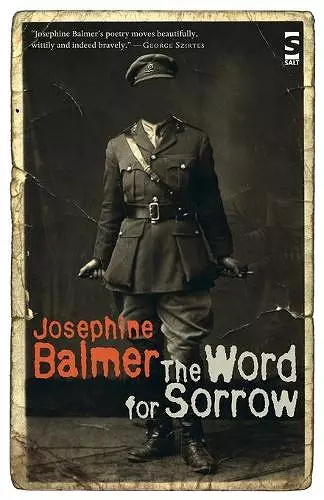The Word for Sorrow
Format:Paperback
Publisher:Salt Publishing
Published:29th Jul '13
Currently unavailable, and unfortunately no date known when it will be back

Josephine Balmer's poetry moves beautifully, wittily and indeed bravely. -- George Szirtes These poems are proof of how the myths and ancient languages and texts still live and work... local, personal (in the best way) and connected: and general also, commonly human, reaching far back. -- David Constantine Josephine Balmer's poetry moves beautifully, wittily and indeed bravely. -- George Szirtes These poems are proof of how the myths and ancient languages and texts still live and work... local, personal (in the best way) and connected: and general also, commonly human, reaching far back. -- David Constantine
From Ovid’s Rome to the blood-soaked trenches of Gallipoli, The Word for Sorrow, brings new resonance to ancient grief. Its powerful and spellbinding poems give voice to the universal suffering of exile, war or grief, celebrating the enduring common humanity that binds us across countries and over all the centuries.
Working on Ovid’s extraordinary but often much-neglected exile poetry with an old second-hand Latin dictionary one stormy spring morning, Josephine Balmer noticed a school-boy’s faded name inked on its fly-leaf and a date, January 1st 1900. The Word for Sorrow explores the story of this dictionary and its owner, who, as a subsequent Google search uncovered, later fought with the British yeomanry in the ill-fated Gallipoli campaign of World War I, near Ovid’s own Black Sea exile. Alongside versions and interpretations of Ovid’s Tristia – the text the dictionary translates – soldiers’ original diaries and letters from Gallipoli provide another rich vein of source material for the original poems of the volume, which also follows Balmer’s own journey as she excavates these entwined narratives, underscoring how the emotional charge of the past still resonates down through the centuries.
Like Chasing Catullus, Balmer’s acclaimed first collection, The Word for Sorrow explores an interplay between translation and original, text and translator, past and present, giving new resonance to ancient grief. An engaging detective story in verse, the work traces the invisible lines that connect us to often surprising points in history, finding common ground in unexpected places, forging often unexpected links between past and present.
From Ovid’s Rome to the blood-soaked trenches of Gallipoli, its powerful and engaging poems give voice to the universal suffering of exile, war and grief, celebrating the enduring common humanity that binds us across countries and over centuries, whether we live at the beginning of the first, the twentieth or the twenty-first century.
The Word for Sorrow crosses boundaries between poetry and translation as versions from Ovid’s Tristia converse with new poems that reflect on experiences behind and beyond them, such as the doomed Allied campaign at Gallipoli during World War I, focusing on weavings of life and text across history towards resonating constants of humanity ... Balmer poignantly reflects T.S. Eliot’s explanations of the ‘mind of the poet’, the sensibility that connects disparities, locating and effecting meaningful wholes.’
-- Paschalis Nikolaou * Norwich Papers *The Word for Sorrow crosses boundaries between poetry and translation as versions from Ovid’s Tristia converse with new poems that reflect on experiences behind and beyond them, such as the doomed Allied campaign at Gallipoli during World War I, focusing on weavings of life and text across history towards resonating constants of humanity ... Balmer poignantly reflects T.S. Eliot’s explanations of the ‘mind of the poet’, the sensibility that connects disparities, locating and effecting meaningful wholes.’
-- Paschalis Nikolaou * Norwich PapeISBN: 9781844719655
Dimensions: 216mm x 140mm x 5mm
Weight: unknown
80 pages